#Early Music Consort of London
Explore tagged Tumblr posts
Text
youtube
Anonymous/Early Music Consort of London, T'Andernaken I The Art of the Netherlands, 1976
0 notes
Text
328: David Munrow with the Early Music Consort of London // Festival of Early Music

Festival of Early Music David Munrow with the Early Music Consort of London 1977, Argo
Every record collection has a few random classical LPs kind of jammed in the last corner of the lowest shelf, found or inherited selections skimmed from the canon. Out of a collection of like 600, let’s give a round of applause for the battered, underplayed late ‘60s copies of Liszt, Mussorgsky, Satie, Dvořák, (and whoever Janis Kļaviņs is), etc. that I have no recollection of acquiring. Today’s review is kind of a tip of the cap to those guys, since despite my fondness and appreciation of classical music I am a malodorous clod who couldn’t tell the difference between a madrigal and a conductus and a tenorlied even if offered many tens of dollars, let alone whether the instrument I am hearing is a crumhorn or a noble sackbut. That kinda terminology is all over the liners of this triple LP boxed set collecting the three records David Munrow and the Early Music Consort of London cut for Argo Records between 1969 and 1973: Ecco La Primavera: Florentine Music Of The 14th Century, Songs of Love and War: Music Of The Crusades (compositions 1137 to 1250), and The Triumphs of Maximilian I (late 15th to early 16th centuries). I like reading the notes by Munrow and other musicologists, which mix a gloss of the history of the times with brief, trenchant analyses of the music that I am again too unschooled to understand. But I like to listen!
youtube
Munrow himself was an interesting figure. Just 33 when he took his own life in a fit of despair, he had already become the seminal figure in what would become an international revival of interest in so-called Early Music, an era spanning the Medieval and Renaissance periods in Europe. A musician and a scholar, he played a great role in research on reconstructing playing techniques from the antiquated notation that survives from the period; rehabilitating traditional instruments; and promulgating these forms as a lecturer and a radio presenter. He was also apparently an extremely deft recorder player, which feels like the musical equivalent of being a world-renowned chalkboard scratcher but speaks to his passion for the purity of more rudimentary forms of music-making.
None of the compositions on these records have the type of melodic or compositional sweep of the symphonies of the Classical or Romantic periods—they are largely short selections that will undoubtedly bring to mind church processions and royal courts, the winds and strings having that distinctly reedy quality that makes my stomach groan for a Medieval Times chicken dinner. Despite my philistinism, I find each of these three albums make for lovely background music for working or reading, and as a lapsed poet I’m appreciative that the compilers include full lyric translations of each song: the Florentine pieces are largely romantic tales of love proposed or thwarted, with a few moral fables tossed in; the Crusades’ pieces are very much “God weeps because you have not throttled the Turk” propaganda, though the threads of faith, outrage, political gamesmanship, and mourning have resonance to this very day; those of Maximilian’s day include a variety of laments, invitations to dance, and instructions for the appropriate ringing of bells.
328/365
#david munrow#early music consort of london#early music#'60s music#'70s music#12th century#13th century#14th century#15th century#16th century#orchestral music#sackbut#crumhorn#recorder#music review#vinyl record
1 note
·
View note
Text
Music Tag Game
Tagged by @haldanare Thank you!
Here are the rules: You gotta shuffle your "on repeat" playlist and then post the first 10 songs. That "on repeat" thing I'm guessing is a Spotify thing? I don't have that, so these are from my computer's music library on shuffle. 1. Sinking Night by AFI 2. Guyamas Sonora by Beirut 3. Bilbo was horrified now that he noticed them for the first time dangling in the shadows, to see a dwarvish foot sticking out of the bottoms of some of the bundles... (part of The Hobbit audiobook) 4. Solage: Helas! Je voy mon cuer (Early consort music of London) 5. Eden Echo by Kamelot 6. Dog Days by Within Temptation 7. Dear Daughters by Tammy Wynette 8. Poetry for the Poisoned Pt. 1 by Kamelot 9. Everybody's Fool by Evanescence 10. Poison Heart by Depeche Mode
I tag @glassshard @deltastic @aisuigetsu @l-ortis @hexnovo @missingrache @femme-foucault @legendarylobster @deadgirlrising @hormse @parttimereptile and @persante
#music#tags#no pressure I just think it's fun!#wow my shuffle really wanted Kamelot. I don't even have that much of it
8 notes
·
View notes
Text
youtube
Cécile McLorin Salvant, who begins her Carnegie Hall Perspectives series this Saturday, stopped by for the Nonesuch Selects video series, in which artists visit the Nonesuch office, pick some of their favorite albums from the music library, and share a few words on their choices. She chose recordings by Philip Glass, Jeff Parker, Caroline Shaw & Attacca Quartet, Early Music Consort of London, Björk, Caetano Veloso, Steve Reich, Dawn Upshaw, Adam Guettel, Gipsy Kings, and monks from Khampagar Monastery.
#cecile mclorin salvant#carnegie hall#philip glass#jeff parker#caroline shaw#attacca quartet#early music#bjork#caetano veloso#steve reich#dawn upshaw#adam guettel#gipsy kings#tibetan buddhism#nonesuch#nonesuch records#nonesuch selects#nonesuch 60#Youtube
3 notes
·
View notes
Text
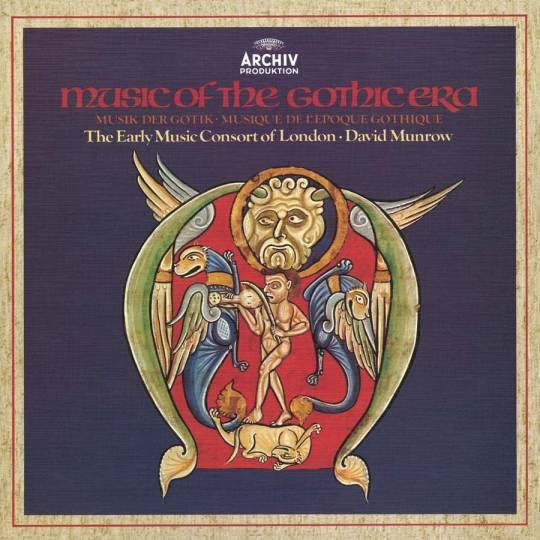
Music of the Gothic Era
· https://spoti.fi/3Zn7U8c
The Early Music Consort of London & David Munrow
* Lp info
David Munrow. English early music pioneer: · http://davidmunrow.org
24 notes
·
View notes
Text
youtube
Johannes Ghiselin (Verbonnet) (fl. 1491-1507) - "Ghy syt die wertste boven al" (about 1500), for four voices,
performed by the Early Music Consort of London, directed by David Munrow.
4 notes
·
View notes
Photo

https://www.youtube.com/watch?v=mw83gXcJnr4
#goth#gothic#early music#gothic music#dark music#david munrow#early music consort of london#early music consort
1 note
·
View note
Text
Sunday Snippets 8.7.22

Happy Sunday, Tumblr! I hope everyone’s weekend has been restful, relaxing, and restorative.
I am here for Six Sentence Sunday. I have snippets from two new stories to share. Ideas for a lot of stories, old and new, are bubbling up; fingers crossed secret ingredients arrive soon and are not delayed by supply chain issues.
And I PROMISE, I am working on some Riam: they’re going to be birthing babies, celebrating 25 years on the throne, and “vacationing” in Texas. Also in the mix: some Liara, DC AU Maxlivia, Little Nobles, One Night Stand, and working on a second part to Déjà vu (trying to work a twist in there).
Snippets are below the cut, but no music inspos just yet. As always, everything is in a state of rough draft, and final product and serving sizes may vary.
Wanderlust (Adventures of a Crown Prince):
We end the call; I absently scratch my bare stomach as I pour a cup of joe, ignoring the cream and sugar.
I like my bad habits undiluted.
I walk over to the window, pulling the heavy drapes apart using a braided gold tassel. Yep, I’m in London. The city is gray and overcast, a sea of umbrella raised against the drizzling rain.
It’s six months after the death of Queen Consort Eleanor. Father thought it best I begin touring foreign countries to expand my knowledge of international politics and policies. I have a decent knowledge of the concept, but textbooks and real-life are two different things. As Crown Prince of Cordonia, it was my duty to be able to speak not only knowledgeably, but from experience.
It was all a farce, two-fold: I was a known runaway, and Constantine had no idea how to handle it. I was punished for my travels within Cordonia, I was berated. But he never asked me why I ran.
Never.
He assumed I wanted to see the world outside of palace walls.
I didn’t.
I was searching for my mother. I still am.
The second reason he sent me away was so he could grieve alone without having to deal with two sons who were also hurting. Eleanor was a loving mother to both Liam and me. She never replaced my mother nor my memories of her; Eleanor didn’t even try. Instead, she gave me new ones to remember her by.
Liam was farmed out to the Walkers, and I was sent to England for a fortnight. I’d like to think Father sent us away for our own safety; it was evident he had enemies, but were they in the Palace? This was a time for us to be a family, to grieve together and show solidarity … not separated and alone under the watchful gaze of guards.
The guards didn’t save Eleanor. They never found my mother. And he thought they were the best course of action.
Life in a Southern Town:
Voting in the Mayoral primaries is in exactly eight weeks, with early voting taking place in four weeks. Please make sure you are registered to vote in what promises to be a true family feud! The candidates are:
Riley Brooks-Rys, the Incumbent. Mayor Brooks-Rys has served two four-year terms as our fearless leader and has brought major employers to our city and surrounding suburbs, kept the tax rate steady; she has also been instrumental in bridging the gap between law enforcement and the community to lower incidences of crime in Creswell.
Her missions and goals for a third term include diversity and inclusion, sustainability, and affordable housing.
Liam Rys: Liam Rys is the ex-husband of the Incumbent, former State Senator, and a current councilmember representing Ward B. Mr. Rys is also chair of the City’s Economic and Development Board. He says that Creswell is ready for change and effective leadership, and he’s the man to do it.
He has not revealed his agenda should he be elected Mayor.
The couple share custody of their two daughters, Eleanor and Fabiana.
Madeleine Amaranth: Current councilmember at-large. She is the former sister-in-law of the Incumbent and lost soundly in the last Mayoral election. Ms. Amaranth is the Southeastern District Manager for Walmart Corporation and can be found cheerfully cashiering at the Diamond Plaza Center store when not traveling for audit and inspections at regional stores.
Councilmember Amaranth is running on a platform of governmental transparency, city growth, and equity for every member of the Creswell community.
Leo Rys: You may remember this candidate as the former District Court Judge who stepped down from the bench for good 18 months ago to hang his shingle as a criminal defense attorney, taking on most of Creswell’s highest profile and murkiest cases.
If elected, Attorney Rys, ex-husband of Councilmember Amaranth, promises to clean out City Hall and repair the communication, economic, and class systems dividing Creswell,
Drake Walker: Mr. Walker, owner of the Saddle Up Bar & Grill located in Government Square, is a familiar face at Council meetings in addition to sitting on both the Neighborhood Affordability Council and the Creswell Transportation Board.
He and the Incumbent were previously involved in a romantic relationship which must not have ended well as he has since sued the city a whopping 12 times, citing that his FOIA requests for public information were never answered.
When asked why he was running to be Mayor of Creswell, Mr. Walker replied with, “That woman is a demon, and it’s time for the Devil’s handmaiden to return to Hell where she belongs.”
We here at Creswell Chat are unsure if Mr. Walker is running on a religious platform or not.
Tagging:@jared2612 @ao719 @burnsoslow @marietrinmimi @merridithsmiscellany-blog @queenjilian @indiacater @kingliam2019 @bebepac @liamxs-world @the-soot-sprite @hopelessromanticmonie @mom2000aggie @cmestrella @iaminlovewithtrr @liamrhysstalker2020 @neotericthemis @twinkleallnight @umccall71 @superharriet @busywoman @gabesmommie1130 @tessa-liam @phoenixrising308 @beezm @gardeningourmet @lovingchoices14 @foreverethereal123 @mainstreetreader @angelasscribbles @lady-calypso @emkay512 @jovialyouthmusic @21-wishes @princessleac1 @charlotteg234 @bbrandy2002 @queenrileyrose @debramcg1106 @alj4890 @yourfavaqua222
In case you’re interested: @motorcitymademadame
31 notes
·
View notes
Note
You know what two things I'm really curious about your political power trio?
How they are each individually viewed by both the court nobles but also the wider population in London and the countryside, as well as how they are viewed together.
How politically active Anne is, especially in regards to not letting her gender stop her and also opening up pathways for women and her charity works that IRL are part of the reason she was killed. (Pretty sure her being made Marquess of Pembroke was the first time a woman had been lifted to that in their own right. Does that still happen in ur AU?)
These are some of my headcanons about this because it’s delightful - thank you so much for asking <3.
Individually it’s like:
Tom Cromwell: a lot of the court is kind of like Will Someone Please Arrest This Commoner For Being A Commoner, though it lessens because (a) it’s pretty clear he isn’t falling out of favour here (b) at a certain point he actually steps away from being Lord Chancellor (what they’d think about the fact that this is because he secretly married the King and Queen and is thus, being an advisor consort is probably not printable ;)). But, in this world the dissolution of the monasteries doesn’t happen so things are much much less controversial and Thomas in general, thus much less so. And there are people who genuinely admire how competent/loyal he is. The general population is, okay so one thing I know is that the people who live in the Dukedom of Essex (especially on the estate) actually love him because he’s a really good land owner etc. Some of it is indifference, some of it is ‘oh yeah, that guy, he’s cool’ (Londoners are divided between ‘upstart’ and ‘love him’).
The country it varies between UGH HIM and indifference.
Anne: BELOVED. One of the history things I thought about is that in this world Anne often gets kind of flattened in popular history to ‘devoted wife and mother who reconciled Henry with his first wife and eldest daughter’ which is true but leaves out her being politically active co-ruler of brilliance/patronage of intellectuals/scholars. But no, she’s beloved. Because in this world, she was able to do the above, she’s a symbol of stability, of pride etc who also does a lot of charity. Henry actually makes her Duchess of Pembroke in her own right in this universe (Elizabeth inherits her title). I think it’s also that people are far far less uneasy about her religion because of The Great Settlement which means genuine freedom of worship (initially just for Christians) and she’s not Held Responsible For Everything That Is Wrong. I think particularly loved by women.
And oh, oh. She funds girls schools! (I also got this from the fact that I read that both Hurrem and Mihrimah Sultan funded girls schools (they also funded universities/medical schools for women) and I was like ANNE WOULD :D. Almost certainly founded/was patron of a college in Cambridge or Oxford, very politically active - Henry has her attending privy council meetings, makes her regent (because of the above people embrace it/her), cultivates an intellectual/creative circle, including women. I’m almost certain she composes a body of music. Also very much involved in expanding the rights of women in law.
(There’s an early incredibly good law on child abuse/sexual assault that is actually largely Thomas Cromwell’s work but Anne absolutely works on expanding rights for women in law in general).
Henry: Genuinely, also beloved. He gets so much more of a chance do some really meaningful policy/reforms (some he actually proposed historically), he’s ensured stability. I think Henry is especially popular with everyone. Yes there’s whispers about his Promotion Of Commoners but it’s only whisperings and it’s definitely not blamed on him (though the rebellion that happened in his reign here was around Indignation About Cromwell’s Status in part but even there, I think it might actually have been a ‘get rid of Cromwell and we can talk’ in part). The Great Settlement is controversial but also because it means people can just like, Do The Church They Want it also isn’t if that makes sense?
Collectively like, they are considered very much ‘co-governors of the kingdom’ before anyone knows about them as marrieds. Tom Cromwell actually gets called ‘the third king/the commoner king’ (as an insult but Henry and Anne are like YES OBVIOUSLY :D) - it’s considered a great governing partnership.
#ot3: political power trio#tudors ot3 verse reference#still figuring some of this out but hopefully this makes sense!
3 notes
·
View notes
Text
youtube
Michael Pretorius /David Munrow · Early Music Consort Of London, Sackbut I Instruments of Middle Age and Renaissance
1 note
·
View note
Text


Queen consorts of England and Britain | [38/50] | Katherine Howard
Katherine was Queen consort of England from 1540 until 1541 as the fifth wife of Henry VIII. She was born sometime around 1521 or 1523 as the daughter of Edmund Howard and Joyce Culpepper. In 1528, Katherine’s mother died and she, along with some of her siblings, were sent to live in the household of her step-grandmother, the Dowager Duchess of Norfolk. The Dowager Duchess was often away so supervision in the household was lax. Despite this, Katherine still had a decent education. She wasn’t very interested in scholarly pursuits, but she could read and write well and she also enjoyed her dance lessons. At around the age of 13, Katherine began music lessons with Henry Mannox. The exact details of the relationship are unknown however, it’s strongly believed it was not consensual and Katherine was abused. Shortly after her relationship with Mannox ended, she began being pursued by Francis Dereham. This relationship is believed to have been consensual and that she and Dereham even referred to each other as husband and wife, although they were never officially married. In 1540, Katherine came to court as a lady in waiting to Anne of Cleves. At this time, she became involved with Thomas Culpepper who was a member of the King’s household. Apparently, she and Culpepper made promises of marriage to each other, but Katherine soon caught the eye of King Henry and became his mistress instead. Shortly afterwards, Henry divorced Anne of Cleves and he and Katherine were married just a few weeks later on 28 July 1540. Katherine had a vivacious and fun-loving personality, but she took her role as Queen very seriously and she also established a good relationship with her step-daughter (and cousin), Elizabeth. During the summer of 1541, Katherine accompanied Henry on a northern progress. At one point, Katherine might have been, or at least believed that she was pregnant however this turned out not to be so. Around early 1541, Katherine is believed to have rekindled her relationship with Culpepper. They never had sexual relations, but they did meet in secret on several occasions and, apparently, it was their intention to eventually consummate their relationship. Eventually, the relationship was discovered and on 23 November 1541, Katherine was stripped of her title as Queen and put under house arrest. Dereham and Culpepper were both executed on 10 December 1541. Katherine remained under house arrest until 10 February 1542 when she was taken to the Tower of London. She refused a trial. While imprisoned, she asked for the execution block to be brought to her so that she could practice. After three days in the Tower, Katherine was executed alongside Jane Boleyn who had allegedly assisted Katherine in her affair.
20 notes
·
View notes
Audio
Febus mundo oriens - Lanista vipereus - Cornibus equivocis Anonymous. Motet isorythmique. (ca. 1360) [fol. 3v-4r. MS CXV (115). “Ivrea Codex”. Biblioteca Capitolare d'Ivrea, Ivrea, Italy]
TRIPLUM Febus mundo oriens / Girans sub ecliptica / Per signa mirifica / Zoe rauptum transiens. // Vapores disperciens / Fervet vi clarifica / Tetraque malefica / Jam procul abiciens. // Radius est igniens / Yma face publica / Rupes et antartica / Loca calefaciens. // Dura liquefaciens / Corda parabolica / Et nunc quondam mistica / Apparere faciens. // Tu lunaque paciens / Eclipsim in practica / A cauda sophistica / Draconis resiliens. // Recipe sufficiens / Lumen ne umbratica / Sis ex arte magica / Unde sis deficiens. DUPLUM Lanista vipereus / Ibis fundens toxicum / Pellitur dum germeus / Vigor est in publicum. // Sic dum comes floreus / Ostendit se Guallicum / Perit sermo felleus / Eum dicens Anglicum. // Zelat miles stelleus / Regni bonum exitum / Quod hostilis malleus / Compressit non modicum. // Constat ut lapideus / Mons dum nil sophisticum / Movet hunc nam aqueus / Flos ad modum apicum. // Inest et equoreus / Dalphinus qui unicum / Reputat nam lacteus / Umor trait reliquum. // Te vero corporeus / Vigor dat terrificum / Et decor purpureus / Te facit angelicum. / TENOR Cornibus equivocis / Pascens inter lilia / Feriens feralia / Et ferarum principem / Debellans multiplicem / Fructum ponens crucifixe / Vaca salit dum infixe / Sunt vires in ilicem / Natans aquam duplicem / Ad delectabilia / Pascua fertilia / Venit cum univocis.
- Music Of The Gothic Era - Musik Der Gotik - Musique De L'Epoque Gothique The Early Music Consort of London, David Munrow (Archiv Produktion, 1976)
4 notes
·
View notes
Photo
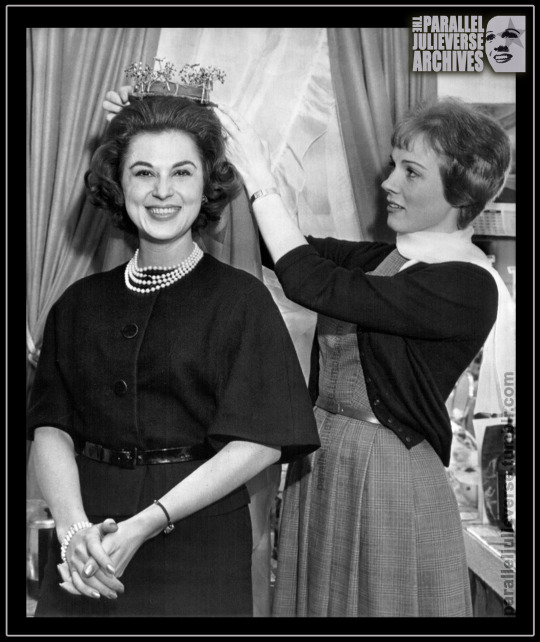

From the PJV Archives: A Star and her Standby
Original caption: Julie Andrews places crown she wears starring in Broadway play ‘Camelot’ on head of her standby, Helena Scott, in New York. Helena, in addition to being Julie’s standby, is the star of her own off-Broadway musical, ‘The Banker’s Daughter’. This unusual arrangement is possible because a standby, unlike an understudy, does not have to be present during a performance. A standby calls in before a performance to make sure the star will go on and after that her time is her own. Helena has an understudy should she have to substitute for Julie. (AP Wirephoto) February 1962
Born Helen Mary Schurgot in Atlantic City in 1928, Scott was a classically trained soprano who studied voice at Juilliard (‘Seashore soprano’, 3). She enjoyed early success as a company soprano with the New York City Opera where she played Musette in Puccini’s La Boheme, Natalie in Lehar’s The Merry Widow and Rose in Weill’s Street Scene (Gaghan, 31). In 1957, Scott sang the role of Natasha in the US premiere production of Prokofieff’s War and Peace which was telecast as a special event on NBC (Durgin, 17). In between operas, Scott performed in several long-running Broadway shows, starting in the chorus before graduating to bigger parts. She was one of the female ensigns helping Mary Martin wash that man outta her hair in South Pacific (1949), a royal consort and, in later performances, Tuptim in The King and I (1951), and a singing principal in the ill-fated Me and Juliet (1953), (Wallace, A-20). Allegedly, it was when she was cast in the latter show that Richard Rodgers suggested she change her stage name from Schurgot to Scott because he had trouble spelling it (Gaghan, 31). Scott’s biggest break came when she was cast to play the lead female role of Rosabella in the UK premiere production of Loesser’s Most Happy Fella in 1960 (Walrath, 29).*
After the London run of Fella, Scott returned to the US but her career didn’t sustain its early impetus. She appeared in a number of regional productions before coming on board in mid-1961 as Julie’s standby in Camelot, a position that had previously been filled by Inga Swenson (Wahls, C23). Scott continued to pursue other work: a music fair ‘tent’ production of The Merry Widow (Gaghan, 31), and the title role in The Banker’s Daughter, the off-Broadway musical mentioned in the caption above, where she received decent notices but the show closed in a matter of weeks (Davis, 37). After Camelot, a few further regional productions ensued: a summer stock tour of The Music Man (1962) opposite Van Johnson (Dear 5-D), and an upstate New York staging of Most Happy Fella (1962) (Walrath, 29).
Thereafter, the public record for Scott grows opaque. During the London run of Most Happy Fella, she met and subsequently become engaged to British publishing director, Christopher Lezard (‘Helena is..’ 15). A brief mention in a Broadway gossip column from late-1962, confirms the pair were married and Scott was moving permanently to London (Winchell, 15). She then seems to have retired from performing, devoting her energies to family life and raising her children, one of whom is British columnist and literary critic, Nicholas Lezard (Lezard 2013).
In terms of her Broadway career, Scott is one of those fascinating figures who hovers in the tenebrous margins of musical theatre history. She never broke through to major stardom and, today, her name would likely draw blanks from even the most ardent Broadway enthusiast. However, she -- along with thousands of others -- formed part of the mostly unsung army of supporting talent that helped shape and give vital form to the ‘golden age’ of the American musical. And Scott did at least leave a documentary legacy of some of her work in the form of recordings for several shows including the musical extravaganza Arabian Nights (1954), the Grieg-inspired operetta Song of Norway (1958), and the original London cast recording of Most Happy Fella (1960). These historical recordings reveal a soprano voice of demonstrable skill and training that was well suited to operetta-style musicals but that would have struggled in the face of the rapidly changing musical idioms of the 1960s.
And, so, to the $64,000 question: did Scott ever actually get to wear that crown on stage during the run of Camelot? While Julie never missed a scheduled performance during her 18-month tenure with Camelot, she did take a planned two-week holiday from the show from 26 October to 9 November 1961, followed by a further one-week break in early-March 1962 to rehearse and tape her TV special, Julie and Carol at Carnegie Hall. And, during those two periods, Scott assumed the role of Guenevere opposite William Squire who had inherited the lead role of King Arthur following Richard Burton’s departure in September 1961 (’Guenevere’ 24). As far as can be ascertained, there weren’t any official reviews of Scott’s brief run in Camelot, though a round-up of Broadway shows by columnist Bruce Galphin (1961) mentioned in passing that “Julie Andrews is gone [from Camelot] and Helena Scott just doesn’t fill the vacuum”. Mind, he also opined that William Squire was “[d]itto..in Burton’s old shoes” (8-A). The principal cast was an impossibly hard act to follow for anyone.
Either way, when time came for Julie to leave Camelot permanently in April 1962 due to pregnancy, Scott doesn’t seem to have been considered as a replacement. The role of Guenevere was initially taken over by Patricia Bredlin, an unknown singer from Wales who was brought over by the producers but who only remained with the show for three months before returning to the UK, reportedly due to homesickness (Gaver, B-2). Bredlin’s understudy, Janet Pavek, assumed the crown for several months (‘Successor’, 39), before Hollywood star, Kathryn Grayson, came onboard as the fourth and final Guenevere, closing the Broadway run before kicking off what would be a very lucrative national tour for the show in early-1963 (‘New Heroine’ 23; ‘“Camelot” Leaving...’, 1E).
Footnote:
* An extra tidbit of trivia, Julie was in the audience for the West End opening night of Most Happy Fella because her-then husband, Tony Walton, designed the scenery and costumes for the London production. Newspaper reports relate that, after the show, she "congratulated the leading lady, Helena Scott, with a rapturous: ‘I loved it’.” (Moynihan, 17; see also Griggs, 10).
Sources
‘“Camelot” Leaving N.Y. for National Tour’ 1963. Democrat and Chronicle. 6 January 1963: p. 1E.
Davis, James 1962. ‘“The Banker’s Daughter” Bright and Gay Musical’. Daily News. 23 January: p. 37.
Doar, Harriet 1962. ‘Music Man So Corny It’s Chic’. The Charlotte Observer. 10 June: 5-D.
Durgin, Cyrus 1957. ‘Impressive New Opera: Prokofieff’s “War and Peace” in US Premiere on NBC-TV.’ Boston Daily Globe, 14 January: p. 17.
Gaghan, Jerry 1961. ‘Opera, Broadway, Now She’s in Tents.’ Philadelphia Daily News. 28 July: p. 31.
Galphin, Bruce 1961. ‘“Camelot”, “Molly” Senior Citizens’. The Atlanta Constitution. 11 December: p. 8-A.
Gaver, Jack 1962. ‘Love Makes Understudy the Queen of “Camelot”’. The State Journal. 13 July: p. B-2.
Griggs, Barbara 1960. ‘The Spell of Corn and Cotton.’ Evening Standard. 27 April: p. 10.
‘Guenevere’ 1961. Daily News. 21 October: p. 24.
‘Guenny’ 1961. Daily News. 9 November: p. 76.
‘Helena is the Most Happy Gal’ 1961. Evening Standard. 12 January: p. 15.
Lezard, Nicholas 2013. Bitter Experience Has Taught Me. London: Faber & Faber.
Moynihan, John 1960. ‘In London Last Night.’ Evening Standard. 22 April: p. 17.
‘New Heroine’ 1962. Daily News. 20 October: p. 23.
‘Seashore Soprano Wins Club Plaudits.’ 1945. Courier-Post, 29 September: p. 3.
‘Successor’ 1962. Daily News. 9 July: p. 39
Wahls, Robert. ‘She’s 109 degrees’. Daily News. 10 November: p. C22-23.
Wahls, Robert 1962. ‘Camelot Queen is a Ringer’. Sunday News. 3 June: p. 25.
Wallace, Weldon 1960. ‘Musical Notes.’ The Sun. 21 February: p. A-20.
Walrath, Jean 1962. ‘Most Happy Fella Delights Audience. ‘ Democrat and Chronicle. 7 August: p. 29.
Winchell, Walter 1962. ‘On Broadway.’ Daily News. 10 September: p. 15.
Copyright © Brett Farmer 2021
8 notes
·
View notes
Text
The House of La Marck
So I found out that all of Anna's siblings are now complete with the addition of her brother William to the Sixtended Verse. Naturally, I decided to draw all four of the La Marck siblings together! Hope you guys like it!
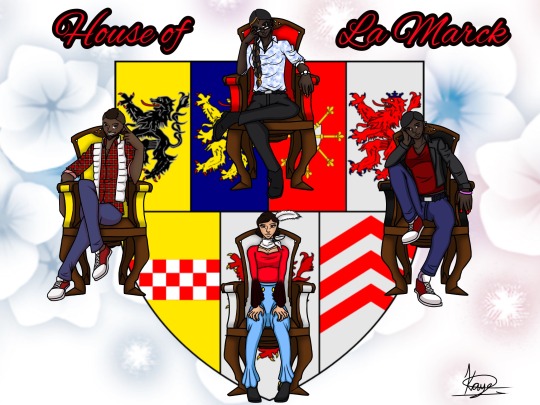
Sibylle von Kleve, Electress Consort of Saxony
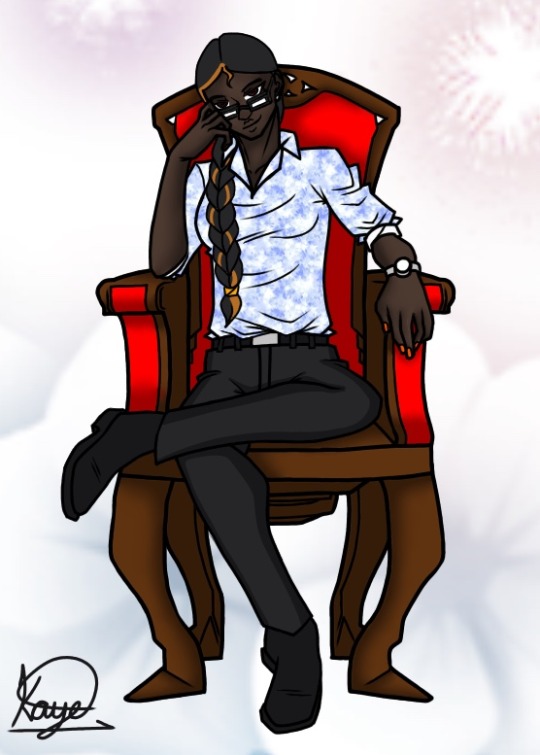
The oldest child of John III the Peaceful, Duke of Cleves and Maria, Duchess of Jülich-Berg. She belonged to the noble House of La Marck until she was married off to the Electoral Prince John Frederick of Saxony and became Electress Consort of Saxony when her husband became Elector of Saxony. They had four children together and Sibylle and her husband showed devotion to each other throughout their lives until their deaths which were mere months apart from each other.
Reincarnated into the modern world, Sibylle appeared as a teen in an orphanage. She had a rough early life switching from foster to foster. Getting into trouble most of the time and actually being sent to a juvenile detention center. After a difficult life in uni as well, she moved to London where she became the events manager at the Arts Theatre and where she reunited with her siblings.
Sibylle von Kleve belongs to yours truly.
Anna of Cleves, Queen Consort of England
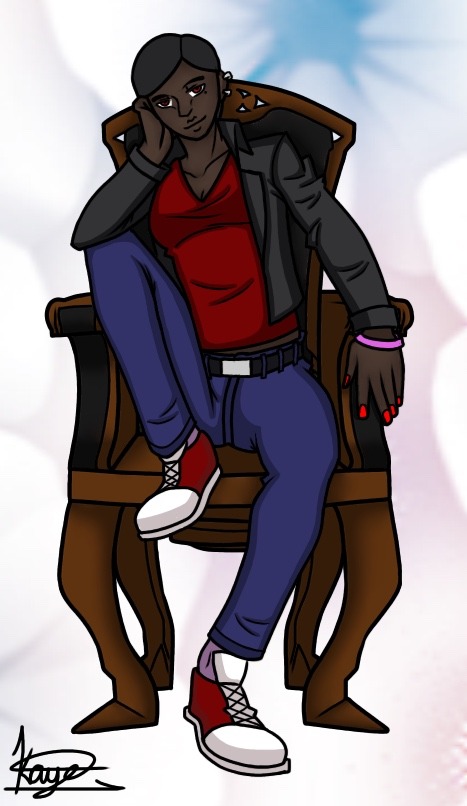
The second child of John and Maria, Anna was married off to Henry Tudor after her portrait was presented to him as well as lengthy negotiations between the House of La Marck and the House of Tudor. She was his fourth wife and his briefest marriage which only lasted around six months. Upon their initial meeting, she humiliated Henry by ignoring his act and advances. Despite this rough first meeting, they got married anyways but did not consummate the marriage due to the king's wounded pride. He divorced her after six months and gave her a palace and riches in order to avoid going to war against Germany. Anna was the last to die out of all the six wives.
Being reincarnated in modern times, Anna lived with the other five queens and four ladies in waiting. They formed a group called Six and perform eight shows a week at the Arts Theatre. Later on, she and her siblings get reunited after many many years.
William the Rich, Duke of Jülich-Cleves-Berg
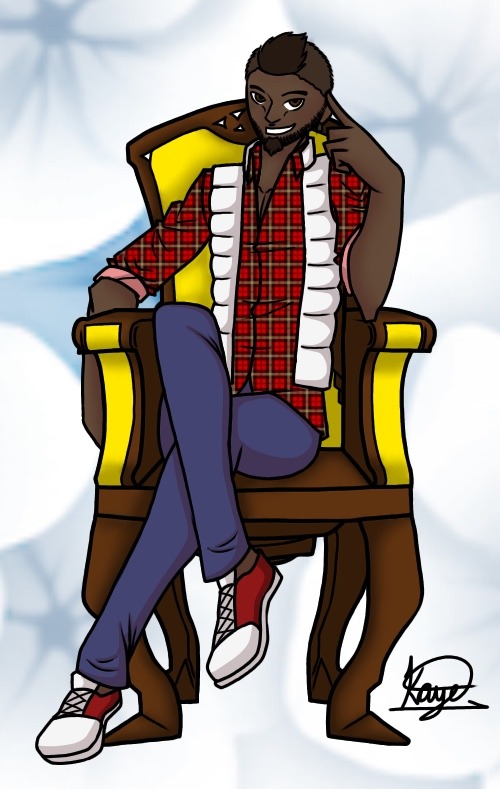
The third child of John and Maria, he inherited his father's position as the Duke of Jülich-Cleves-Berg and the head of the House of La Marck. He married twice. The first one ended in annulment and the second was to Archduchess Maria of Austria. They had seven children but only six lived into adulthood. He earned the moniker of 'William the Rich' due to his efforts in strengthening his inherited territories.
Reincarnated in the modern world, William is very laid back and came across Six the Musical accidentally and where he finally got to reunite with his sisters.
William belongs to @lexartsstuff
Amalia von Kleve-Jülich-Berg
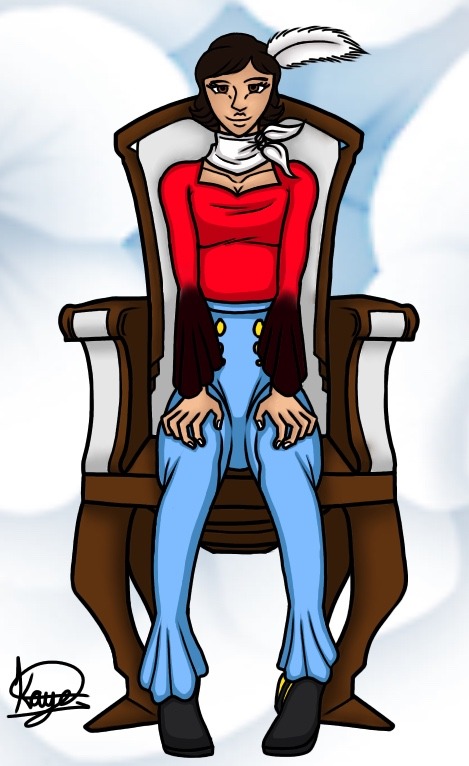
Amalia is the youngest child of John and Maria. She and Anna had their portraits painted and presented to Henry Tudor to pick for his next wife. Anna was picked and was sent to England to be married off. Amalia, for years, had been negotiated for political and strategical marriages but none came through. There were two negotiations that almost fell through but her brother William refused to marry her off to either of the two due to the oldest being an outcast for his raucous and immoral behavior and the other was twelve years younger than her. She stayed unmarried for the rest of her life.
Being reincarnated in modern times, she became the song writer for Six the Musical and worked with the Ladies in Waiting for the compositions of the songs. Later on, she finally reunites with her older siblings and couldn't be happier than ever.
Mali belongs to @pandora-dusk
#six#six the musical#sixtended verse#sibylle von cleves (sixtended)#sibylle of cleves (sixtended)#anna von kleve (six)#anna of cleves (six)#william of jülich cleves berg (sixtended)#mali von kleve#amalia von kleve (sixtended)#my art
33 notes
·
View notes
Text
youtube
Antoine Brumel (c. 1460 – 1512 or 1513) - Du tout plongiet - Fors seulemnet ·
David Munrow · Early Music Consort of London
0 notes
Photo
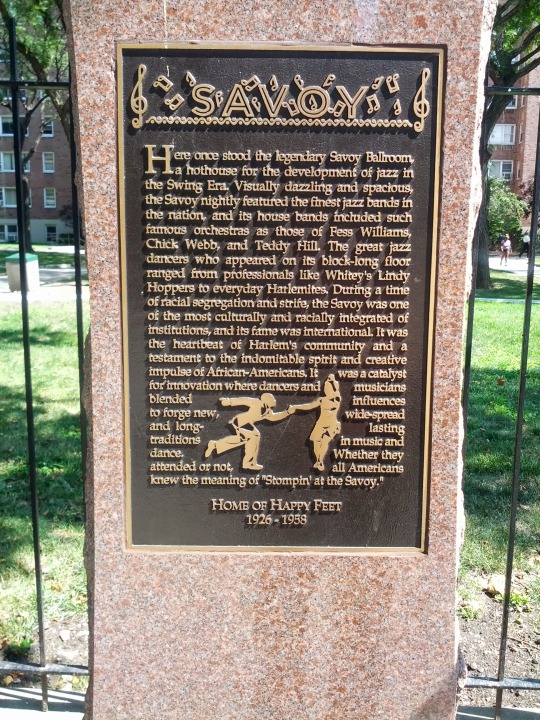

The Savoy Ballroom was a large ballroom for music and public dancing located at 596 Lenox Avenue, between 140th and 141st Streets in the Harlem neighborhood of Manhattan, New York City. Lenox Avenue was the main thoroughfare through upper Harlem. Poet Langston Hughes calls it the Heartbeat of Harlem in Juke Box Love Song, and he set his work "Lenox Avenue: Midnight" on the legendary street. The Savoy was one of many Harlem hot spots along Lenox, but it was the one to be called the "World's Finest Ballroom". It was in operation from March 12, 1926, to July 10, 1958, and as Barbara Englebrecht writes in her article "Swinging at the Savoy", it was "a building, a geographic place, a ballroom, and the 'soul' of a neighborhood". It was opened and owned by white entrepreneur Jay Faggen and Jewish businessman Moe Gale. It was managed by African-American business man and civic leader Charles Buchanan. Buchanan, who was born in the British West Indies, sought to run a "luxury ballroom to accommodate the many thousands who wished to dance in an atmosphere of tasteful refinement, rather than in the small stuffy halls and the foul smelling, smoke laden cellar nightclubs ..."
The Savoy was modeled after Faggen's downtown venue, Roseland Ballroom. The Roseland was a mostly white swing dance club. With swing's rise to popularity and Harlem becoming a connected black community, The Savoy gave the rising talented and passionate black dancers an equally beautiful venue. The ballroom, which was 10,000 square feet in size, was on the second floor and a block long. It could hold up to 4,000 people. The interior was painted pink and the walls were mirrored. Colored lights danced on the sprung layered wood floor. In 1926, the Savoy contained a spacious lobby framing a huge, cut glass chandelier and marble staircase. Leon James is quoted in Jazz Dance as saying, "My first impression was that I had stepped into another world. I had been to other ballrooms, but this was different – much bigger, more glamour, real class ..."
The Savoy Ballroom was named after the Savoy Hotel in London as those who named the ballroom felt this gave the ballroom a classy, upscale feeling, as the hotel is a very elite, upscale hotel.
The Savoy was popular from the start. A headline from the New York Age March 20, 1926, reads "Savoy Turns 2,000 Away On Opening Night – Crowds Pack Ball Room All Week". The ballroom remained lit every night of the week.
The Savoy had the constant presence of the best Lindy Hoppers, known as "Savoy Lindy Hoppers". Occasionally, groups of dancers such Whitey's Lindy Hoppers turned professional and performed in Broadway and Hollywood productions. Whitey turned out to be a successful agent, and in 1937 the Marx Brothers' movie A Day at the Races featured the group. Herbert White was a bouncer at the Savoy who was made floor manager in the early 1930s. He was sometimes known as Mac, but with his ambition to scout dancers at the ballroom to form his own group, he became widely known as Whitey for the white streak of hair down the center of his head. He looked for dancers who were "young, stylized, and, most of all, they had to have a beat, they had to swing".
Unlike many ballrooms such as the Cotton Club, the Savoy always had a no-discrimination policy. The clientele was 85% black and 15% white, although sometimes there was an even split. Lindy hop dancer Frankie Manning said that patrons were judged on their dancing skills and not on the color of their skin: "One night somebody came over and said, 'Hey man, Clark Gable just walked in the house.' Somebody else said, 'Oh, yeah, can he dance?' All they wanted to know when you came into the Savoy was, do you dance?".
The northeast corner of the dance floor, nicknamed "Cats' Corner," was monopolized by the best and boldest dancers. Some sources claim only Whitey's Lindy Hoppers were permitted to dance there, while others are less specific. Competition for a place in Cats' Corner was fierce, and every serious hopper awaited the nightly "showtime". Other dancers would create a horseshoe around the band and "only the greatest Lindy-hoppers would stay on the floor, to try to eliminate each other". On 140th street was the opposite, mellow corner which was popular with dancing couples. The tango dancer known as The Sheik frequented this corner.
Many dances such as Lindy Hop (which was named after Charles Lindbergh and originated in 1927) were developed and became famous there. It was known downtown as the "Home of Happy Feet" but uptown, in Harlem, as "the Track" because the floor was long and thin. The Lindy Hop is also known as The Jitterbug and was born out of "mounting exhilaration and the 'hot' interaction of music and dance". Other dances that were conceived at the Savoy are The Flying Charleston, Jive, Snakehips, Rhumboogie, and variations of the Shimmy and Mambo. Capitol Records released at least one album devoted to the club, The Home of Happy Feet, from 1959.
It is estimated that the ballroom generated $250,000 in annual profit in its peak years from the late 1920s to the 1940s. Every year the ballroom was visited by almost 700,000 people. The entrance fee was 30 to 85 cents per person, depending on what time a person came. Thirty cents was the base price, but after 6pm the fee was 60 cents, and then 85 cents after 8pm. The Savoy made enough money by its peak in 1936 that $50,000 was spent on remodeling.
The ballroom had a double bandstand that held one large and one medium-sized band running against its east wall. Music was continuous as the alternative band was always in position and ready to pick up the beat when the previous one had completed its set. The bouncers, who had previously worked as boxers, basketball players, and the like, wore tuxedos and made $100 a night. The floor was watched inconspicuously by a security force of four men at a time who were headed by Jack La Rue, and no man was allowed in who wasn't dressed in a jacket with a tie. Besides the security staff, the Savoy was populated by "Harlem's most beautiful women": the Savoy Hostesses. They would be fired for consorting with patrons outside the ballroom, but inside the hostesses would teach people to dance and were dance partners for anyone who purchased a 25 cent dance ticket. Roseland Ballroom hostesses often visited the Savoy on their night off; this inspired Buchanan to create Monday Ladies-Free Nights. Other special events began during the week, including the giveaway of a new car every Saturday. The floor had to be replaced every three years due to frequent use.
During the 1930s, Chick Webb was the bandleader of the Savoy's most popular house band. Ella Fitzgerald, fresh from a talent show victory at the Apollo Theater in 1934, became its teenage vocalist. Webb also recorded the 1934 big band song and jazz standard "Stompin' at the Savoy", which is named for the Savoy. The Savoy was the site of many Battle of the Bands or Cutting Contests, which started when the Benny Goodman Orchestra challenged Webb in 1937. Webb and his band were declared the winners of that contest. In 1938, Webb was challenged by the Count Basie Band. While Webb was declared the winner again, there was a lack of consensus on who won. Earle Warren, alto saxophonist for Basie, reported that they had worked on the song "Swingin' the Blues" for competing and says, "When we unloaded our cannons, that was the end".
Floating World Pictures made a documentary called The Savoy King about the ballroom. It was shown at the 50th New York Film Festival. Other prominent Savoy house bandleaders included Al Cooper, Erskine Hawkins, Lucky Millinder (with Wynonie Harris on vocals), Buddy Johnson, and Cootie Williams.
The Savoy participated in the 1939 New York World's Fair, presenting "The Evolution of Negro Dance".
The ballroom was shut down in April 1943 as a result of "charges of vice filed by the police department and Army". Its license was renewed in mid-October of the same year.
7 notes
·
View notes